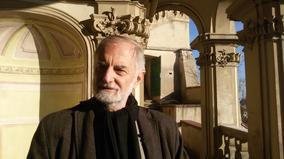Eugen Brikcius was born on 30 August 1942 in Prague. After graduation he worked for one year in construction, spent three years operating an electric cart at a train station, he worked in a textile warehouse, two years in a paper mill, then a year in a research institute with computers, and then with the renowned theoretician of modern art Jindřich Chalupecký in the Špalova Gallery (1967–68). During this time, he also studied four years of economics and then philosophy and sociology at the Faculty of Arts at Charles University and philosophy at University College in London (68–70), where he completed his dissertation Ontological Argument in 1982. He was exempted from serving in the army due to health reasons.
In the second half of the 1960s, Brikcius organized happenings, that is, “exercises” in which he developed the two fundamental principles of his lifelong poetics — mystification as a manifestation of a deeper truth and the estrangement of the everyday — by staging artistically meaningful events. For the realization of his happening entitled Thanksgiving (1967), he was found guilty of disorderly conduct. Both Brikcius and the prosecutor (who demanded a harsher sentence) appealed, and the fair-minded judge, on the basis of professional opinions by J. Chalupecký, B. Hrabal and I. Vyskočil declared the happening to be a form of artistic expression.
In the seventies, Brikcius supported himself as a free-lance artist, a teacher of English, and a translator. He became close to the Crusaders’ School of Pure Humor Without Wit, along with Magor (by the way, Brikcius is the one who came up with this nickname for Jirous) Kořan, and Daníček, he was imprisoned for the defamation of Czechoslovakia. He began composing Latin verses, was one of the first signatories of Charter 77, and in 1980 was forced into exile due to the Rehabilitation Campaign of the secret police. He settled in Vienna and since 1990 has divided his time between Vienna and Prague, where he organizes literary excursions and ecumenia.
Brikcius’s graphic art and recordings of his eventsare stored in the collections of Prague’s National Gallery, and his manuscripts in the Memorial of National Literature. In book form, he has published: Artists Explained or Art History Fairy Tales (1991), Collected Works (1992), Listen (1993), Cadus Rotundus / Round Keg (1993), The Consolation of Mystification (1995), Eugenical Verses(2000), Dreams of Eugen Brikcius, (2002), Charming Drive and other Fiction (2003), Greek Blue (2004), Capricious Call (2005), Compassion of the Flesh (2008), Mesón El Centro (2010), Lowering with My Dear (2011), Valid Story (2012), My Best Possible Life (2012), And the Flesh Became Word (2013, He received the Jaroslav Seifert Award for his collected works) and a travel novel partially in verse Intangible Odyssey (2016).
pb





